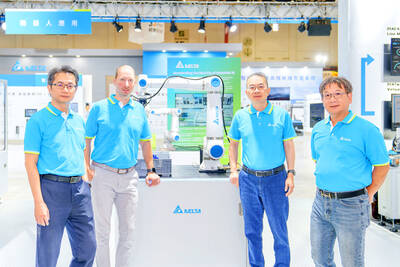An architecture firm said on Saturday it may seek at least US$1 million in damages from the Ukrainian government for scrapping a contract to remodel a Kiev stadium to host the Euro 2012 football tournament.
“We are still seeking to win back the contract. If the effort fails, we do not rule out suing the Ukrainian government for damages, which should be a minimum of US$1 million,” Archasia Design Group (瀚亞設計公司) president Eric Hsu (許少游) said.
Hsu said Taiwan’s representative at the WTO had raised the issue with Ukraine’s WTO representative.
Archasia has also sought China’s help to stop Ukraine from awarding the contract to a German firm. Archasia has signed up the China Metallurgical Group Corp to carry out the renovation of the Kiev Olympic Stadium.
“We heard that China State Council’s Taiwan Affairs Office is taking the issue seriously and has been contacting Ukraine since June,” he told reporters.
Archasia is seeking China’s help in settling the issue because Taiwan does not have diplomatic ties with Ukraine, and China does.
Archasia has already filed a lawsuit with a Kiev court against the Ukrainian sports ministry for canceling the contract.
On April 16, Archasia beat 18 contestants to win the bid to renovate the Olympic Stadium for Euro 2012, to be cohosted by Ukraine and Poland.

SETBACK: Apple’s India iPhone push has been disrupted after Foxconn recalled hundreds of Chinese engineers, amid Beijing’s attempts to curb tech transfers Apple Inc assembly partner Hon Hai Precision Industry Co (鴻海精密), also known internationally as Foxconn Technology Group (富士康科技集團), has recalled about 300 Chinese engineers from a factory in India, the latest setback for the iPhone maker’s push to rapidly expand in the country. The extraction of Chinese workers from the factory of Yuzhan Technology (India) Private Ltd, a Hon Hai component unit, in southern Tamil Nadu state, is the second such move in a few months. The company has started flying in Taiwanese engineers to replace staff leaving, people familiar with the matter said, asking not to be named, as the

The prices of gasoline and diesel at domestic fuel stations are to rise NT$0.1 and NT$0.4 per liter this week respectively, after international crude oil prices rose last week, CPC Corp, Taiwan (台灣中油) and Formosa Petrochemical Corp (台塑石化) announced yesterday. Effective today, gasoline prices at CPC and Formosa stations are to rise to NT$27.3, NT$28.8 and NT$30.8 per liter for 92, 95 and 98-octane unleaded gasoline respectively, the companies said in separate statements. The price of premium diesel is to rise to NT$26.2 per liter at CPC stations and NT$26 at Formosa pumps, they said. The announcements came after international crude oil prices

DOLLAR SIGNS: The central bank rejected claims that the NT dollar had appreciated 10 percentage points more than the yen or the won against the greenback The New Taiwan dollar yesterday fell for a sixth day to its weakest level in three months, driven by equity-related outflows and reactions to an economics official’s exchange rate remarks. The NT dollar slid NT$0.197, or 0.65 percent, to close at NT$30.505 per US dollar, central bank data showed. The local currency has depreciated 1.97 percent so far this month, ranking as the weakest performer among Asian currencies. Dealers attributed the retreat to foreign investors wiring capital gains and dividends abroad after taking profit in local shares. They also pointed to reports that Washington might consider taking equity stakes in chipmakers, including Taiwan Semiconductor

STABLE DEMAND: Delta supplies US clients in the aerospace, defense and machinery segments, and expects second-half sales to be similar to the first half Delta Electronics Inc (台達電) expects its US automation business to remain steady in the second half, with no signs of weakening client demand. With demand from US clients remaining solid, its performance in the second half is expected to be similar to that of the first half, Andy Liu (劉佳容), general manager of the company’s industrial automation business group, said on the sidelines of the Taiwan Automation Intelligence and Robot Show in Taipei on Wednesday. The company earlier reported that revenue from its automation business grew 7 percent year-on-year to NT$27.22 billion (US$889.98 million) in the first half, accounting for 11 percent